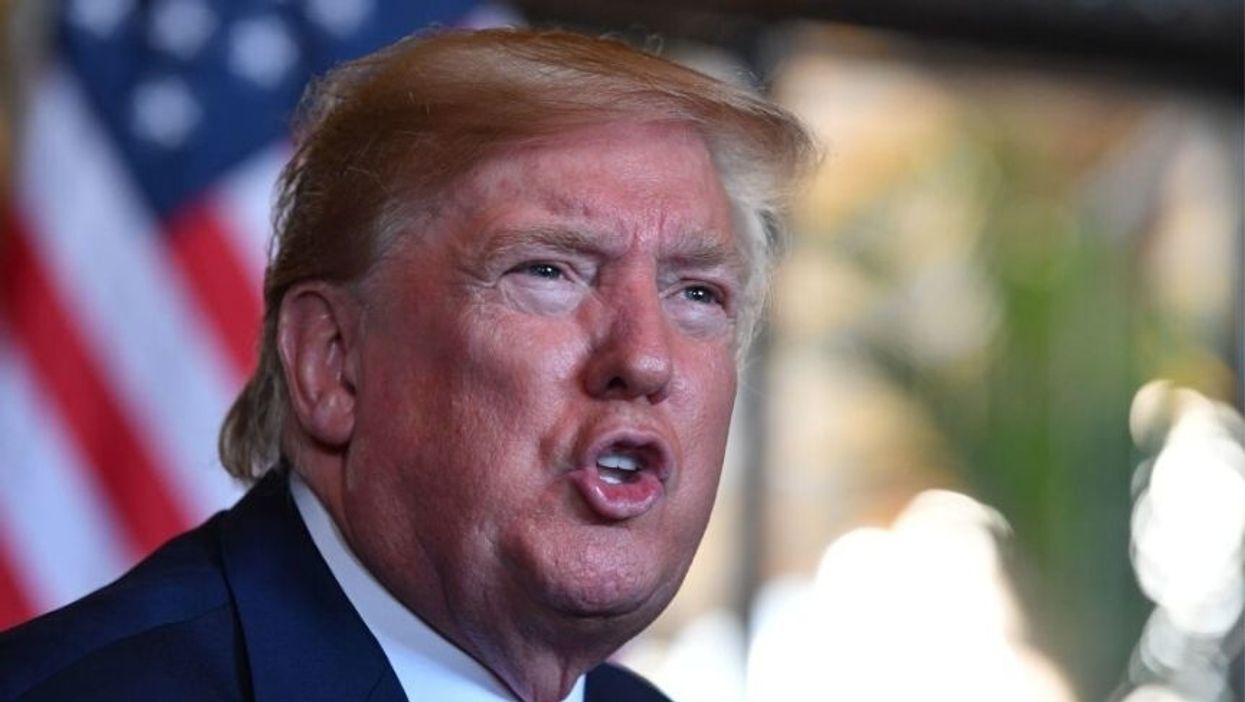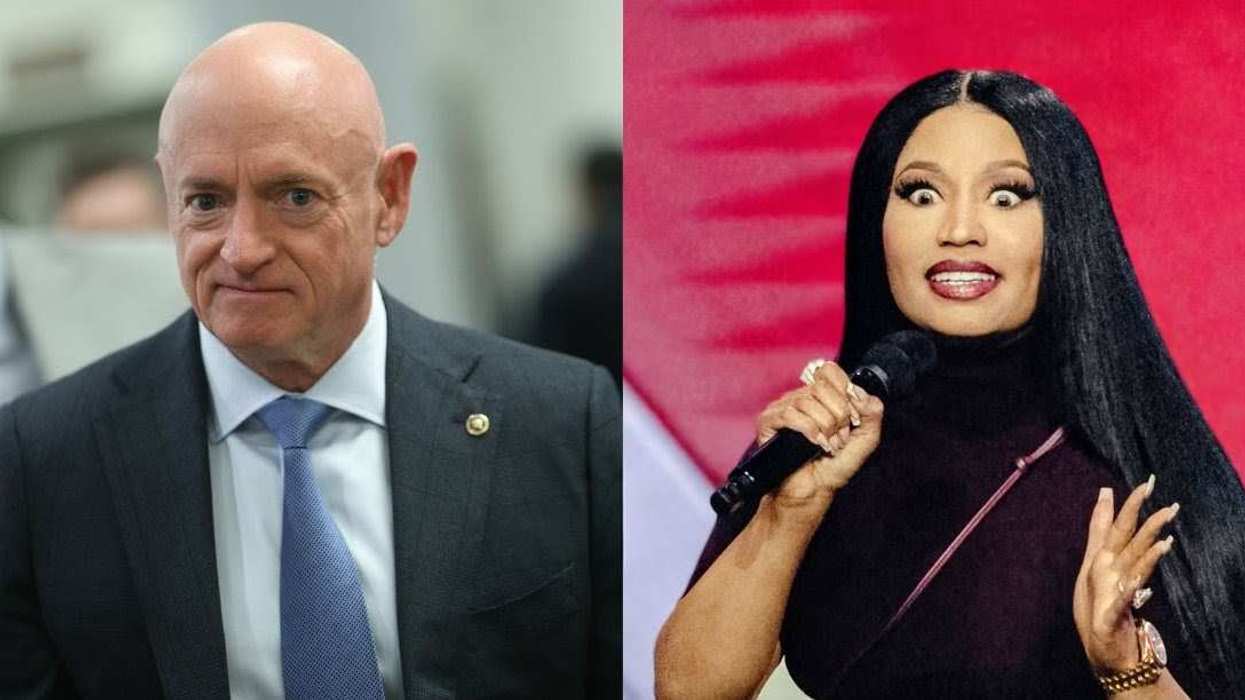President Donald Trump mobilized Republican voters with far-right, nationalist ideologies in 2016 and in the three years since that election, we've seen Republican lawmakers go from condemning the President's dangerous rhetoric to excusing it or even amplifying it.
But while Trump may have forced his party to the right with his recklessness, a new poll indicates that Trump's well of Republican radicalism might be tapped out, pushing Americans leftward instead.
The Atlantic's David Frum cited a new poll to demonstrate just how many groups have shifted to the left since Trump's inauguration, comparing it to the paltry number going further to the right.
The poll, conducted by Pew Research Center, surveyed thousands of voters in 2017 and found that Democratic Party identification is at its highest level since 2009.
According to the poll, women have gotten more Democratic:
"Among registered voters, 56% of women affiliate with or lean toward the Democratic Party, compared with 44% of men."
Voters of color are widely Democratic as well, with 84% of Black voters, 63% of Hispanic voters, and 65% of Asian voters identifying as Democrats.
When it comes to education's impact on political support, Pew noted a diametric shift decades in the making:
"In 1994, 39% of those with a four-year college degree (no postgraduate experience) identified with or leaned toward the Democratic Party and 54% associated with the Republican Party. In 2017, those figures were exactly reversed."
The intersections of age and gender found that 70% of millennial women identified as Democrats, a substantial move to the left:
"This wide gender gap among Millennial voters is largely attributable to a marked shift among Millennial women. As recently as 2014, the Democratic advantage among Millennial women was a narrower – but still substantial – 21 percentage points, compared with 47 points today. "
But one of the most interesting revelations was that even some solidly Republican religious groups are becoming less enthusiastic about their party:
"While Mormon voters remain a solidly Republican group (72% overall are Republican or Republican leaning), in recent years Mormons have been less likely to identify as Republican than in the past.Mormon voters are now about as likely to identify as independent (41%) as they are to identify as Republican (45%). For most of the past two decades, majorities of Mormons called themselves Republicans."
The findings were heartening to some.
For others, the numbers represented a call to action.
Oddly enough, the growing number of Democrats doesn't mean they'll enjoy an electoral victory in 2020. Both Republicans elected to the Presidency in the 21st century have done so without winning the popular vote.
The poll suddenly made some Republican tactics make more sense.
The 2020 election can't come soon enough.








 Roberto Schmidt/AFP via Getty Images
Roberto Schmidt/AFP via Getty Images





 u/pizzaratsfriend/Reddit
u/pizzaratsfriend/Reddit u/Flat_Valuable650/Reddit
u/Flat_Valuable650/Reddit u/ReadyCauliflower8/Reddit
u/ReadyCauliflower8/Reddit u/RealBettyWhite69/Reddit
u/RealBettyWhite69/Reddit u/invisibleshadowalker/Reddit
u/invisibleshadowalker/Reddit u/Wishnik6502/Reddit
u/Wishnik6502/Reddit u/kateastrophic/Reddit
u/kateastrophic/Reddit u/blking/Reddit
u/blking/Reddit u/SlagQueen/Reddit
u/SlagQueen/Reddit u/geezeslice333/Reddit
u/geezeslice333/Reddit u/meertaoxo/Reddit
u/meertaoxo/Reddit u/crystal_clear24/Reddit
u/crystal_clear24/Reddit u/stinkpot_jamjar/Reddit
u/stinkpot_jamjar/Reddit
 u/Bulgingpants/Reddit
u/Bulgingpants/Reddit
 @hackedliving/TikTok
@hackedliving/TikTok @hackedliving/TikTok
@hackedliving/TikTok @hackedliving/TikTok
@hackedliving/TikTok @hackedliving/TikTok
@hackedliving/TikTok @hackedliving/TikTok
@hackedliving/TikTok @hackedliving/TikTok
@hackedliving/TikTok @hackedliving/TikTok
@hackedliving/TikTok @hackedliving/TikTok
@hackedliving/TikTok @hackedliving/TikTok
@hackedliving/TikTok @hackedliving/TikTok
@hackedliving/TikTok
 @vanderjames/Instagram
@vanderjames/Instagram @vanderjames/Instagram
@vanderjames/Instagram @vanderjames/Instagram
@vanderjames/Instagram @vanderjames/Instagram
@vanderjames/Instagram @vanderjames/Instagram
@vanderjames/Instagram @vanderjames/Instagram
@vanderjames/Instagram @vanderjames/Instagram
@vanderjames/Instagram @vanderjames/Instagram
@vanderjames/Instagram @vanderjames/Instagram
@vanderjames/Instagram @vanderjames/Instagram
@vanderjames/Instagram